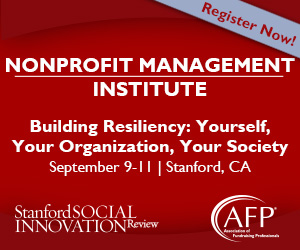ISSUE
Articles on social change from the latest edition of SSIR

Summer 2010
Volume 8, Number 3
Social media—such as Facebook and Twitter—can be cost-effective and powerful tools for organizations to increase their social impact and enhance the way that they work. In the summer 2010 issue of Stanford Social Innovation Review, Monitor Institute consultants detail how some organizations have become more effective by using social media to transform themselves into networked organizations. The authors of “Working Wikily” go on to provide a road map for organizations that want to do the same.
Features
Measuring Social Value
Too many people believe social value is objective, fixed, and stable, when in fact it is subjective, malleable, and variable.
Thinking Straight About Sustainability
Sustainability is the best way to integrate social, environmental, and economic impacts into all corporate decisions.
A Good Business for Poor People
Microfranchising poses fewer risks and offers greater benefits than does creating a new business from scratch.
Working Wikily
A few nonprofits are using social media to fundamentally change the way they work and increase their social impact.
What's Next
Big Payoffs from Small Savings
SaveTogether wants to foster the savings habit among low-income Americans.
Containing a Global Health Care Crisis
Used shipping containers become health care clinics in the developing world.
Unreasonable and Ready
A new social enterprise incubator fills two critical gaps facing social entrepreneurs: mentoring and access to capital.
Game-Changers of the World, Unite
Play this online game and learn social innovation strategies to solve global crises.
Field Report
A Bigger Pie
Mission Pie, a for-profit bakery and café, supports local farmers while training at-risk kids.
Financing Freedom
Microlending in leprosy colonies frees residents from poverty, shame, and isolation.
Case Study
Fueling Growth
Riders for Health has created a novel approach to maintaining health transport vehicles in sub-Saharan Africa.
Viewpoint
The Nonprofit Paradox
Nonprofits tend to recreate within their own organizational cultures the very social problems they are trying to solve.
Scaling Impact
Scaling requires not only fidelity to core processes and programs, but also constant adjustments to local needs and resources.
The Mouths of Gift Horses
Why nonprofits should court contributions that help both themselves and society.
Research
Next to Godliness
People are more likely to engage in moral behavior when they are in a clean-scented room.
Evil Green
New research shows that buying green products makes people more likely to cheat and steal.
Fermenting Innovation
New public-private partnerships have led to big leaps in the exportation of Argentinian wine.
Lucrative but Deadly
As parents spend more time raising their profitable coffee crop, they spend less time attending to their children's needs.
Local Warming
Global warming may end up helping some poor farmers who will be able to sell their crops for higher prices.
Books
Come on up to the Rising
A PARADISE BUILT IN HELL: The Extraordinary Communities That Arise in Disaster by Rebecca Solnit
Doing Good by Being Bad
MOVING POLITICS: Emotions and ACT UP’s Fight Against AIDS by Deborah B. Gould
Lessons from an Organizer
CREATIVE COMMUNITY ORGANIZING: A Guide for Rabble-Rousers, Activists, and Quiet Lovers of Justice by Si Kahn
Q&A
Jeffrey Sachs
Jeffrey Sachs believes we must lift a billion-plus people out of poverty while reducing our impact on the environment.
 → This form is for US/Canada subscribers. Are you an international subscriber?
→ This form is for US/Canada subscribers. Are you an international subscriber?
Click here instead.
Subscribe Now!
Subscribers get premium online access (articles with a key) including 9-year archive, downloadable digital edition, quarterly print issues (optional).









































































